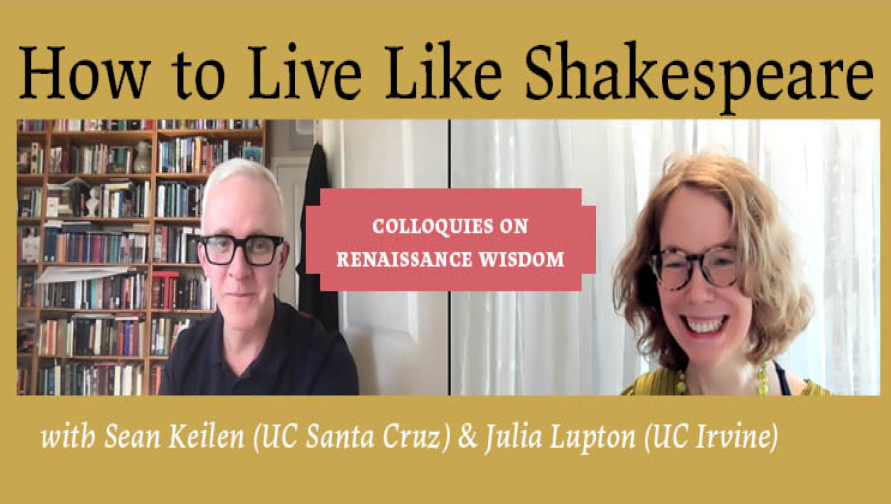

Each Monday at noon, from April to May, 2021, I would sit down with a mug of tea in hand and wonder what I would hear that day: an actor sharing his backstage experience of A Midsummer Night's Dream? An impassioned defense of one of Shakespeare's most humorously humiliated characters? Or maybe I would learn about the philosophical ideas of Shakespeare's day.
How to Live Like Shakespeare: Colloquies on Renaissance Wisdom was a free eight-part series led by UCI’s Julia Lupton and UCSC’s Sean Keilen. The program focused on a new virtue each Monday, from imagination to empathy to courage, featuring scholars and actors as they discussed Shakespeare as a guide to living.
Lupton wanted to “bring the UCI and UCSC communities together.” The plan worked even better than expected: around a hundred attendees tuned in each week, including students, educators, actors, and fans not just from California, but from all around the world.
The idea for the series came to Lupton after she had to leave work to recover from a car accident. After delving into Stoic philosophy and studying Psalms at her synagogue, Lupton says, “I started approaching reading as a form of therapy, a way of evaluating our passions and goals and training our imaginations to comprehend moral patterns.” Would it be possible, she wondered. “to read Shakespeare’s plays in the tradition of spiritual exercises, like those designed by classical philosophers and developed in wisdom traditions around the world?”
Similarly, Keilen is interested in “sustain[ing] a lively and intelligent conversation about wisdom that engages Shakespeare as a participant as well as an object of study.”
And indeed, the series has drawn viewers into deep conversation with the Bard and his works. Howard Mirowitz, a fund manager and MBA instructor participating in the series, connected Shakespeare’s plays to the magpie-like writing process of Bob Dylan: both artists collect things from the thinkers before them, cobbling their findings together into something beautifully unique. “It not only adds to the fun and the reward of watching the play or listening to the song, it makes you go back and reconsider everything that you thought about the original thing that is being alluded to.”
Luckily, framing Shakespeare’s work through his influences—and reframing those influences with Shakespeare—is what this series is all about. Ketu Katrak, a drama professor at UCI, said that she loved reading Shakespeare with “medieval texts, the Book of Proverbs, classics—such as Cicero, Aristotle, Ovid, Plato, Petrarch, and Greek and Egyptian myth.”
The sessions didn’t just connect Shakespeare to his past. Participants were also able to relate the discussion around Shakespeare’s plays to their own lives. This might include using the subjects talked about in the sessions to support a discussion with a friend, or comparing one’s own philosophy to earlier thought. Anna Ladokhin, a recent graduate of Reed College and a long-time New Swan community member, was struck by resemblances between Malvolio’s treatment in Twelfth Night and internet bullying.
Throughout the series, participants encountered Shakespeare’s wisdom in new settings: other works of fiction, Eastern philosophy, and their own lives. In the session on “Woman Wisdom: Cleopatra and Isis,” the group explored the unique mixture of Greek, Hebrew, and Egyptian visions of feminine wisdom, and how those shaped Shakespeare’s Cleopatra.
The week after, Shakespeare’s sonnets were used as a jumping-off point to discuss the nature of forgiveness. As Sean Keilen said, “Shakespeare’s vision of human experience is rich, complex, and open-ended. It repays whatever attention we can give it.”
Lupton and Keilen plan another series in Winter 2022, perhaps on Shakespeare and Psalms, and they also hope to write a book together drawing on their shared commitment to living with Shakespeare.
Megan Strand is an Engish major at UCI and an intern for the New Swan Shakespeare Center.
